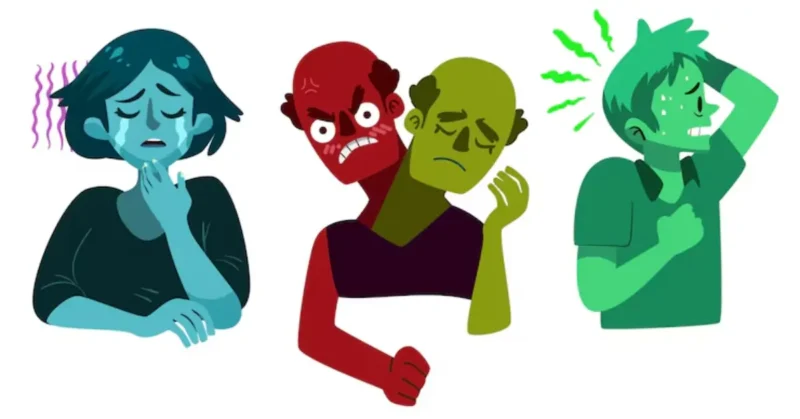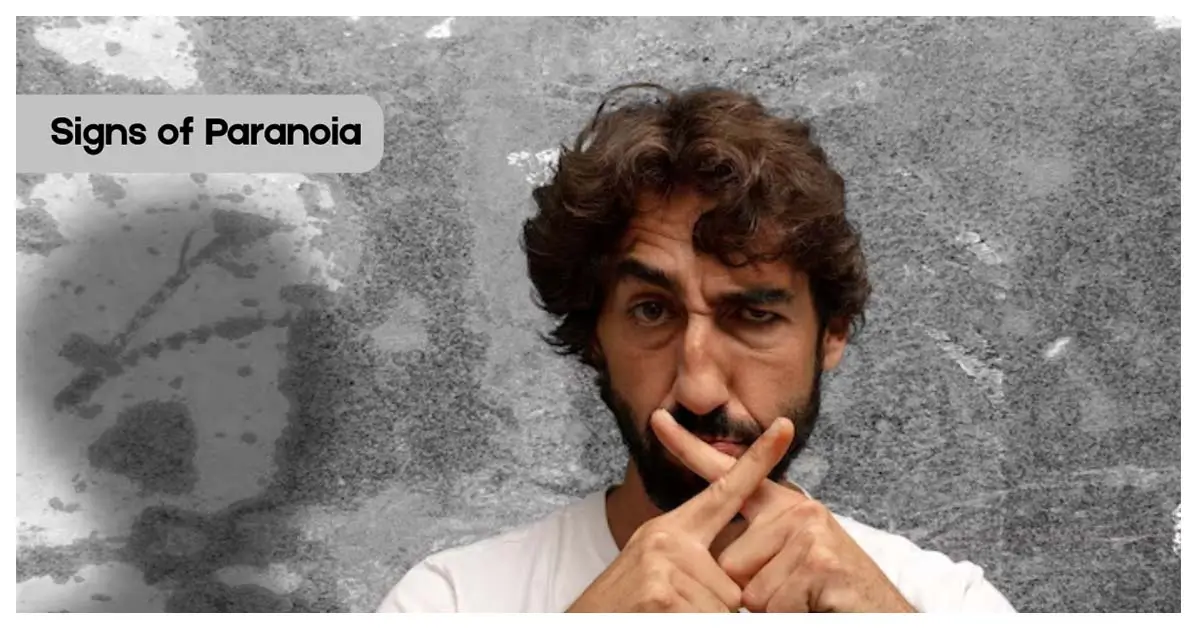Learn the key signs of paranoia, what causes them, and how to treat this complex mental health condition. Discover practical strategies for coping and healing today.
Thank you for reading this post, don't forget to subscribe!How to Recognize the Early Signs of Paranoia and What to Do Next
Ever feel like someone’s watching you—or that others are out to get you, even without proof? While occasional doubt is normal, persistent fear and mistrust might point to deeper concerns. Understanding the signs of paranoia is the first step toward regaining control and clarity. Whether you’re worried about your thoughts or those of someone close to you, recognizing early symptoms can help prevent emotional distress and social isolation. In this post, we’ll explore the common causes of paranoia, how it feels, and, most importantly, what you can do to get help and start healing.
Signs of Paranoia You Shouldn’t Ignore
Paranoia involves intense, irrational mistrust of others, often without clear evidence. Recognizing the early signs of paranoia can help prevent worsening symptoms and social withdrawal. This post will explore its causes, symptoms, diagnosis, and treatment options.
Do you often feel like someone is watching you or talking behind your back—even when there’s no real evidence? While occasional doubt is normal, constant suspicion can point to a deeper issue: paranoia. Understanding the early signs of paranoia is key to managing it effectively. This condition affects how people think, relate to others, and interpret the world around them. In this comprehensive guide, we’ll explore the causes, symptoms, diagnosis, and treatments of paranoia—and show you how to find the help and support you need.
What Is Paranoia?

Extreme, baseless mistrust and suspicion of other people are hallmarks of the mental health illness known as paranoia. People who are paranoid frequently think that others are trying to hurt them, spy on them, or conspire against them. Although these ideas are mostly unfounded in reality, they can have a significant negative influence on a person’s capacity for social, emotional, and professional functioning.
While paranoia can exist as a standalone condition, it is also a symptom of more complex disorders like paranoid personality disorder, delusional disorder, or schizophrenia.
Early Signs of Paranoia You Shouldn’t Ignore
Recognizing the signs of paranoia early can prevent long-term psychological harm. Here are some common indicators:
- Constant suspicion: Believing others have negative intentions, even without proof.
- Hypervigilance: Being overly alert and watching people or surroundings for threats.
- Misinterpreting actions: Taking harmless gestures or conversations as personal attacks.
- Social withdrawal: Avoiding friends, family, or social gatherings out of fear or mistrust.
- Defensiveness: Reacting strongly or aggressively to perceived criticism.
- Irrational fears: Worrying about being followed, watched, or poisoned.
If these thoughts interfere with daily life, it’s essential to seek support.
What Causes Paranoia?
Paranoia can result from several biological, psychological, and environmental factors.
Biological Factors
Genetics: Vulnerability may be increased if psychotic disorders run in the family.
Brain chemistry: Perception can be distorted by imbalances in neurotransmitters such as dopamine.
Aspects of Psychology
Trauma: Persistent mistrust and protective behavior might result from past abuse or neglect.
- Cognitive distortions: Paranoid ideas are reinforced by negative cognitive processes.
Environmental Factors
Social isolation: Paranoia can be exacerbated by a lack of deep connections.
Chronic stress: Anxious and suspicious thinking can be exacerbated by high-stress situations.
Typical Signs of Paranoia
There are several levels of paranoia, ranging from mild to severe. Among the main symptoms are:
False suspicions that people are scheming to harm you
- Reluctance to provide information or avoid making eye contact
- Belief in hidden meanings in ordinary interactions
- The constant need for reassurance due to mistrust
- Difficulty maintaining relationships
These symptoms may be constant or triggered by stress, trauma, or substance use.
How Paranoia Affects Relationships and Daily Life
Paranoia can lead to broken relationships, job difficulties, and emotional isolation. Constant mistrust can push loved ones away, while workplace paranoia may lead to conflict with coworkers or supervisors. The affected individual may find it hard to accept feedback, share ideas, or ask for help.
Over time, this isolation can reinforce paranoid thoughts, creating a self-fulfilling cycle of mistrust and withdrawal.
How Is Paranoia Diagnosed?

Diagnosis usually begins with a mental health evaluation.
- Clinical Interviews: Therapists gather detailed information about the individual’s background and experiences.
- Psychological Assessments: Tools like the Green Paranoid Thought Scales help measure levels of paranoia.
- Observation: Behavior in social and clinical settings provides insight into symptom severity.
It’s critical to rule out other illnesses like substance-induced psychosis, PTSD, and anxiety.
Effective Paranoid Treatments
Typically, therapy, medication, and lifestyle changes are used to manage paranoia.
Options for Therapy
- Cognitive behavioral therapy, or CBT, assists people in recognizing and reframing illogical beliefs.
- Supportive Therapy: Builds trust and provides a safe space to express feelings.
Medication Support
- Antipsychotics: Used for severe or persistent paranoid thoughts.
- Anxiolytics or Antidepressants: Useful for managing co-occurring anxiety or depression.
Lifestyle and Self-Help Strategies
- Mindfulness and relaxation techniques to manage stress.
- Regular exercise, sleep, and a balanced diet support mental health.
- Joining support groups to reduce isolation and build trust.
Living With Paranoia: Practical Coping Tips
While paranoia can be challenging, many people learn to manage it with the right tools:
- Practice grounding techniques during anxious moments.
- Keep a thought journal to track irrational beliefs and reality-check them.
- Build a support system of people you trust.
- Engage in creative or therapeutic activities that bring joy and focus.
When to Seek Help
If paranoid thoughts begin interfering with your work, relationships, or daily peace of mind, don’t wait. Consult a qualified mental health specialist for advice. You may regain control over your thoughts and life and stop symptoms from getting worse with early intervention.
FAQs
Q. What is the cause of paranoia, and what is the treatment?
Environmental, psychological, and biological variables all play a part in paranoia. Genetic predisposition, brain chemistry imbalances (especially dopamine), trauma, chronic stress, and social isolation can all contribute. Lack of sleep and substance misuse might also set off paranoid thoughts. Depending on the severity, treatment may involve antipsychotic drugs, cognitive behavioral therapy (CBT), and lifestyle modifications like routine and stress reduction. The likelihood of recovery increases with early diagnosis. Consistent care and supportive surroundings are crucial. It is possible to handle paranoia with the correct support.
Q. Which kind of action is most effective for treating paranoid personality disorder?
The most effective treatment for paranoid personality disorder (PPD) is long-term psychotherapy, especially cognitive behavioral therapy. CBT helps patients recognize distorted thought patterns and gradually develop trust. Antipsychotics or anti-anxiety medications may be provided if symptoms worsen. However, they are not usually the first option. Because people with PPD may be resistant to therapy, a strong therapeutic alliance is essential to success. Family involvement and psychoeducation can also support recovery. Consistency and patience in therapy make a significant difference. The goal is to reduce fear, improve relationships, and enhance quality of life.
Q. Why am I getting paranoid about everything?
Feeling paranoid about everything may result from chronic anxiety, high stress, past trauma, or isolation. Your brain might be overstimulated by fear or uncertainty, causing you to misinterpret situations as threatening. Sleep deprivation, excessive pondering, and exposure to upsetting material can all exacerbate it. It may occasionally be an indication of a more serious mental health condition, such as a mood illness or delusional thinking. If these thoughts still bother you or get in the way of your daily activities, speaking with a therapist may provide clarity and comfort. You are not alone, and there is support available.
Q. How do I stop my paranoia?
To stop paranoia, begin by recognizing your thoughts without judgment and grounding yourself in the present. To find trends and triggers, keep a notebook. Every day, engage in deep breathing, mindfulness, and relaxation techniques. To get perspective, discuss your anxieties with a therapist or close friend. Steer clear of drugs and alcohol, as these might exacerbate paranoid thoughts. You may require therapy and medication if your symptoms are bothersome or frequent. It takes time to recover, but every little step helps you feel more balanced and safe.
Q. Can you self-treat paranoia?
Self-help techniques, including journaling, reducing stressful triggers, and practicing mindfulness, can frequently aid people with mild paranoia. Reducing anxious thoughts can be achieved by establishing a healthy routine, obtaining enough sleep, and partaking in relaxing activities. Professional assistance is necessary, nevertheless, if your paranoia worsens, persists, or gets in the way of your day-to-day activities. In moderate to severe cases, self-treatment is a useful first step but should not be used in place of therapy. The finest results are frequently obtained by combining the two methods. Do not be afraid to ask for help.
Q. How do you stop being so suspicious?
Being overly suspicious often stems from fear of betrayal, past trauma, or low self-trust. Work on refuting unfavorable assumptions and looking for proof before drawing conclusions in order to lessen distrust. Ask for an explanation before passing judgment, and engage in open contact with others around you. Rebuilding trust and identifying the underlying cause are two benefits of therapy. Additionally, mindfulness and meditation help you think more clearly by calming your mind. You can become less reactive in relationships and feel more secure over time by practicing patience and introspection.
Conclusion: Understanding and Overcoming Paranoia
Paranoia is more common than many people realize—and it’s treatable. Early detection of paranoia can result in prompt assistance and healing. There are effective treatments and methods, regardless of whether the problem is brought on by stress, trauma, or more serious mental health conditions. You or your loved one can live a more balanced, tranquil life, rebuild trust, and lessen fear with the correct support.
Read more articles on Health and Wellness.
You might like to read:

